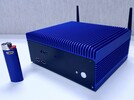Intel Core i9-9900T

Der Intel Core i9-9900T ist eine High-End-CPU mit acht Kernen auf Basis der Coffee Lake-Architektur, die im Oktober 2018 vorgestellt wurde. Im Vergleich zum deutlich schneller getakteten Core i9-9900K, ist der 9900T mit einem deutlich niedrigeren TDP spezifiziert. Der Prozessor taktet mit 2,1 - 4,4 GHz und kann dank Hyperthreading bis zu 16 Threads gleichzeitig bearbeiten. Gefertigt wird der Inter Core i9-9900T im verbesserten 14-nm-Prozess (14nm++).
Performance
Durch die acht CPU-Kerne bietet die CPU trotz der geringeren Taktung eine ordentliche Multi-Threaded-Leistung. Die Single-Core Leistung ist aufgrund des relativ hohen Turbo von bis zu 4,4 GHz relativ schnell. Wie immer ist die Leistung aber stark von der Kühlung abhängig. Im Idealfall hällt der 9900T mit den schnellen 6-Kernern der Vorgängergeneration mit.
Grafikeinheit
Die nun als Intel UHD Graphics 630 bezeichnete iGPU taktet mit 1.200 MHz genauso schnell wie zuvor. somit ist kein nennenswerter Performancevorteil zu erwarten. Als Low-End-Lösung können aktuelle Videospiele, wenn überhaupt, lediglich in verminderter Detailstufe flüssig wiedergegeben werden.
Leistungsaufnahme
Intel beziffert die Thermal Design Power auf 35 Watt und damit deutlich unter den 95 Watt des 9900K. Dadurch kann man deutlich kleinere und schwächere Kühllösungen nutzen.
| Codename | Coffee Lake-R | ||||||||||||||||||||||||||||||||
| Serie | Intel Coffee Lake | ||||||||||||||||||||||||||||||||
Serie: Coffee Lake Coffee Lake-R
| |||||||||||||||||||||||||||||||||
| Taktung | 2100 - 4400 MHz | ||||||||||||||||||||||||||||||||
| Level 1 Cache | 512 KB | ||||||||||||||||||||||||||||||||
| Level 2 Cache | 2 MB | ||||||||||||||||||||||||||||||||
| Level 3 Cache | 16 MB | ||||||||||||||||||||||||||||||||
| Anzahl von Kernen / Threads | 8 / 16 | ||||||||||||||||||||||||||||||||
| Stromverbrauch (TDP = Thermal Design Power) | 35 Watt | ||||||||||||||||||||||||||||||||
| Herstellungstechnologie | 14++ nm | ||||||||||||||||||||||||||||||||
| Die Größe | 178 mm2 | ||||||||||||||||||||||||||||||||
| Max. Temperatur | 100 °C | ||||||||||||||||||||||||||||||||
| Socket | FCLGA1151 | ||||||||||||||||||||||||||||||||
| Features | Dual-Channel DDR4-2666 Memory Controller, HyperThreading, AVX, AVX2, AES-NI, TSX-NI, Quick Sync, Virtualization, vPro | ||||||||||||||||||||||||||||||||
| GPU | Intel UHD Graphics 630 (350 - 1200 MHz) | ||||||||||||||||||||||||||||||||
| 64 Bit | 64 Bit wird unterstützt | ||||||||||||||||||||||||||||||||
| Architecture | x86 | ||||||||||||||||||||||||||||||||
| Anfangspreis | $439 U.S. | ||||||||||||||||||||||||||||||||
| Vorgestellt am | 08.10.2018 = 2397 days old | ||||||||||||||||||||||||||||||||
| Produktinformationen beim Hersteller | ark.intel.com | ||||||||||||||||||||||||||||||||
Benchmarks
* Smaller numbers mean a higher performance
Noch keine Testberichte für diese CPU gefunden.













